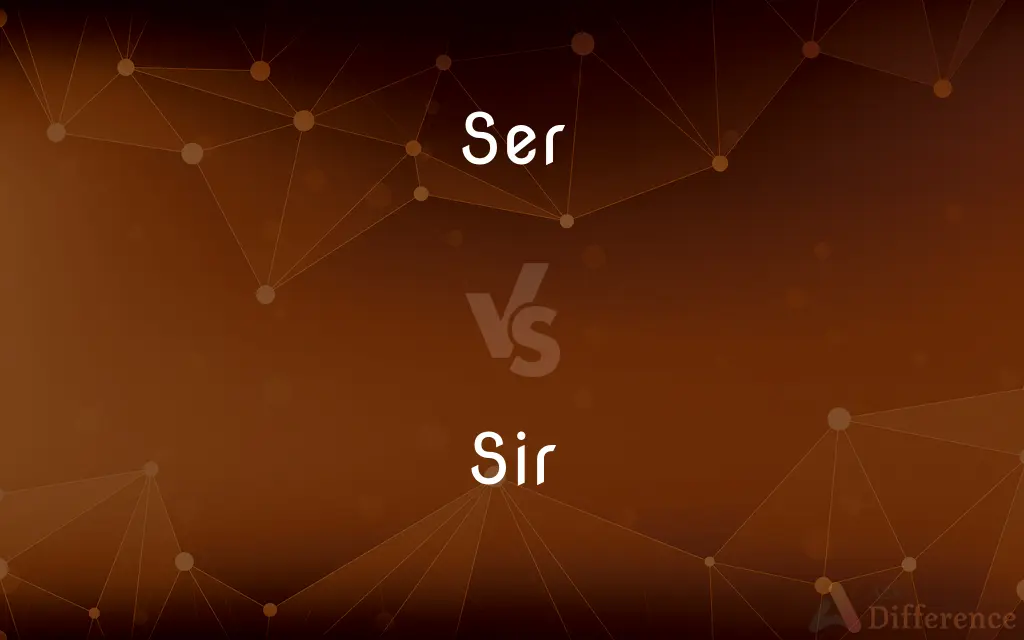Ser vs. Sir — What's the Difference?
By Tayyaba Rehman — Updated on April 1, 2024
Ser is a title used in fiction for knights, denoting respect and status, whereas Sir is a formal title used in real life for knights or baronets in the British honours system.

Difference Between Ser and Sir
Table of Contents
ADVERTISEMENT
Key Differences
Ser is a title employed in fictional settings, particularly in fantasy literature and media, to denote a knight or someone of similar rank. It's a form of address that conveys respect and often implies a certain level of authority or prowess in battle. On the other hand, Sir is the honorific address used in contemporary settings, specifically within the British honours system, to refer to individuals who have been knighted or granted a baronetcy, signifying their contributions to their field or society at large.
In the realm of fantasy, characters addressed as Ser are often involved in quests, battles, and serve as protectors of the realm or their liege. This title suggests a medieval setting or a society inspired by chivalric orders. Whereas Sir is used in real-life circumstances to acknowledge a person's achievements or services, and its recipients are often leaders, philanthropists, artists, and scholars, recognized by the monarch.
The use of Ser in literature and media serves to immerse the reader or viewer in a world governed by distinct social hierarchies and honor codes. It's a stylistic choice that evokes a sense of tradition and nobility. Conversely, Sir is a tangible recognition by society, often accompanied by formal ceremonies and tangible honors, underscoring the recipient's real-world impact and legacy.
Characters or individuals addressed as Ser are typically bound by a code of chivalry, emphasizing virtues like honor, loyalty, and courage. This fictional title often implies a backstory of training, valor, and service. In contrast, being knighted as a Sir in real life does not require martial prowess but rather outstanding achievement in one's field or significant contribution to the community.
Finally, the distinction between Ser and Sir highlights the difference between fictional narratives and real-world honorifics. While Ser allows authors and creators to craft stories of heroism and adventure set against a backdrop of fantasy, Sir celebrates actual individuals whose accomplishments have had a significant impact on society, culture, or their field of expertise.
ADVERTISEMENT
Comparison Chart
Context
Used in fictional, often fantasy, settings.
Used in real-world contexts, particularly in the British honours system.
Significance
Denotes a knight in a fictional setting, often implying valor and chivalric virtues.
A title for individuals knighted or made baronets, recognizing their achievements or service.
Requirements
Fictional valor, often depicted through heroism in battle or loyalty to a cause.
Real-life achievements or contributions to society, culture, or a specific field.
Ceremony
Bestowed in a fictional narrative, often without a real-world equivalent.
Involves a formal investiture ceremony by the monarch or a representative.
Representation
Represents an idealized version of chivalry and knighthood in fantasy worlds.
Reflects real-life honor and recognition for contributions to society or one's field.
Compare with Definitions
Ser
A fictional title for knights in "A Song of Ice and Fire."
Ser Jorah Mormont is loyal to Daenerys Targaryen.
Sir
A polite address for a man.
Excuse me, sir, you dropped your wallet.
Ser
A term from the Westerosi chivalric code.
He was knighted and became a Ser.
Sir
A title given for exceptional achievements or service.
Sir Walter Raleigh was an English explorer.
Ser
A form of address for fictional knights in Westeros.
Ser Davos, I need your counsel.
Sir
A formal prefix for names of knighted individuals.
Sir Arthur Conan Doyle penned Sherlock Holmes.
Ser
A fictional honor given for valor or loyalty.
For his bravery, he was made a Ser.
Sir
A term of respect in various professional settings.
Yes, sir, your request has been processed.
Ser
A literary alternative to the title "Sir."
He dreamt of becoming a Ser like his heroes.
Sir
An honorific title for men, especially knights or baronets.
Sir Paul McCartney is an iconic musician.
Ser
(in some fantasy and sci-fi novels) An address or courtesy title to any person, especially if their gender and/or form of address are unknown.
Would ser care to dine this evening?
Sir
Sir is a formal English honourific address for men, derived from Sire in the High Middle Ages. Traditionally, as governed by law and custom, "Sir" is used for men titled as knights, i.e., of orders of chivalry, and later also applied to baronets and other offices.
Sir
Sir Used as an honorific before the given name or the full name of baronets and knights.
Sir
Used as a form of polite address for a man
Don't forget your hat, sir.
Sir
Used as a salutation in a letter
Dear Sir or Madam.
Sir
A man of a higher rank or position.
Sir
A respectful term of address to a man of higher rank or position, particularly:
Sir
To a knight or other low member of the peerage.
Just be careful. He gets whingy now if you don't address him as Sir John.
Sir
To a superior military officer.
Sir, yes sir.
Sir
To a teacher.
Here's my report, sir.
Sir
A respectful term of address to an adult male (often older), especially if his name or proper title is unknown.
Excuse me, sir, do you know the way to the art museum?
Sir
To address (someone) using "sir".
Sir, yes, sir!
Don't you sir me, private! I work for a living!
Don't you sir me, private! I work for a living!
Sir
A man of social authority and dignity; a lord; a master; a gentleman; - in this sense usually spelled sire.
He was crowned lord and sire.
In the election of a sir so rare.
Sir
A title prefixed to the Christian name of a knight or a baronet.
Sir Horace Vere, his brother, was the principal in the active part.
Sir
An English rendering of the LAtin Dominus, the academical title of a bachelor of arts; - formerly colloquially, and sometimes contemptuously, applied to the clergy.
Instead of a faithful and painful teacher, they hire a Sir John, which hath better skill in playing at tables, or in keeping of a garden, than in God's word.
Sir
A respectful title, used in addressing a man, without being prefixed to his name; - used especially in speaking to elders or superiors; sometimes, also, used in the way of emphatic formality.
Sir
Term of address for a man
Sir
A title used before the name of knight or baronet
Common Curiosities
Is the title Sir hereditary?
No, the title Sir is not hereditary. It is awarded to individuals for their lifetime achievements.
What are the responsibilities of a Ser?
A Ser typically upholds chivalric codes, including bravery, loyalty, and protection of the realm or liege.
What is the main difference between Ser and Sir?
Ser is a fictional title for knights, whereas Sir is a real-life title awarded for achievements or service.
Can the title Sir be revoked?
Yes, in rare cases, the title Sir can be revoked if the individual is found to have acted in a manner that discredits their honor.
What is the process for being knighted in real life?
The process involves nomination, review by committees, and then investiture by the monarch.
Can women be addressed as Ser or Sir?
In fictional settings, women can be addressed as Ser. In real life, women awarded the equivalent honor are addressed as Dame, not Sir.
How does one become a Ser in fantasy literature?
Becoming a Ser usually involves notable deeds, valor, or service to a cause or realm in fantasy literature.
Do Sers exist in real life?
No, Ser is a title used exclusively in fictional or fantasy contexts.
What kind of contributions might earn someone the title Sir in real life?
Contributions in fields such as science, arts, charity, public service, or any significant service to the community or nation.
Is there a female equivalent to Ser in fantasy settings?
In most fantasy settings, Ser is gender-neutral, but some works might use specific titles for female knights.
What does being knighted as a Sir signify?
Being knighted as a Sir signifies recognition of one’s significant contributions to society, culture, or a particular field.
Are there any fictional works where women are addressed as Ser?
Yes, some fantasy works and series address women as Ser, especially in settings that emphasize gender equality in titles of knighthood.
Can anyone be addressed as Ser in a fantasy setting?
Typically, only characters who have earned the title through valor, deeds, or by following a specific code are addressed as Ser.
How is the title Sir officially awarded?
The title Sir is awarded by the monarch during a formal investiture ceremony.
Do the titles Ser and Sir carry the same level of respect in their respective contexts?
Yes, both titles carry a high level of respect in their respective contexts, denoting honor, achievement, or valor.
Share Your Discovery

Previous Comparison
Unsalable vs. Unsaleable
Next Comparison
Kinesthesiology vs. KinesiologyAuthor Spotlight
Written by
Tayyaba RehmanTayyaba Rehman is a distinguished writer, currently serving as a primary contributor to askdifference.com. As a researcher in semantics and etymology, Tayyaba's passion for the complexity of languages and their distinctions has found a perfect home on the platform. Tayyaba delves into the intricacies of language, distinguishing between commonly confused words and phrases, thereby providing clarity for readers worldwide.













































